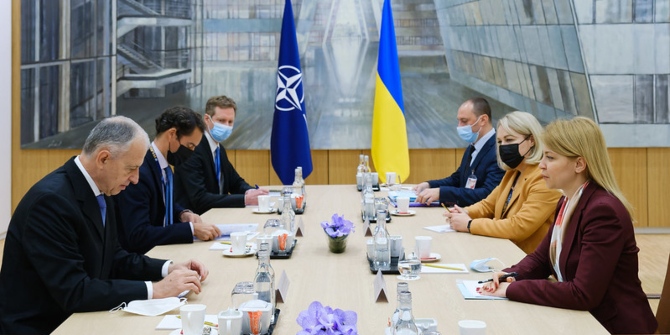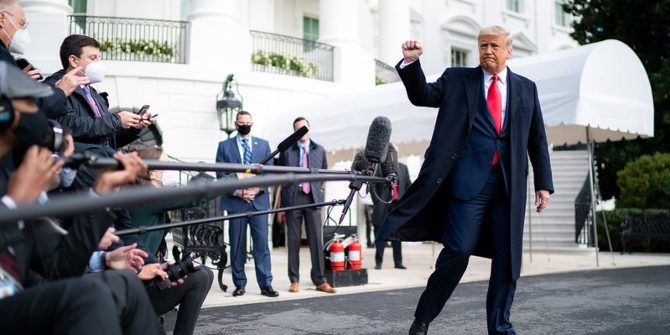 This week President-elect Joe Biden announced his picks for a number of his administration’s cabinet posts. In this Q&A, Julie Norman writes that the selection of experienced Obama administration veterans, such as Anthony Blinken for Secretary of State, may mean smooth Senate confirmations, and also point to a Biden foreign policy characterised by stability and multilateral cooperation.
This week President-elect Joe Biden announced his picks for a number of his administration’s cabinet posts. In this Q&A, Julie Norman writes that the selection of experienced Obama administration veterans, such as Anthony Blinken for Secretary of State, may mean smooth Senate confirmations, and also point to a Biden foreign policy characterised by stability and multilateral cooperation.
Who are Biden’s key nominees so far?
President-elect Biden has nominated a cadre of serious, well-qualified individuals who have years of experience in foreign policy and security posts. Antony Blinken, the nominee for Secretary of State, served as Deputy Secretary of State and Deputy National Security Advisor in the Obama administration, and worked closely with Biden on the Senate Foreign Relations Committee. National Security Advisor nominee Jake Sullivan was National Security to Advisor to Biden when he was Vice President and was a lead foreign policy advisor to both the Clinton 2016 and Biden 2020 campaigns. Linda Thomas-Greenfield, the nominee for UN Ambassador, is a career Foreign Service Officer who served as Assistant Secretary for African Affairs under the Obama administration. Biden has also nominated Alejandro Mayorkas to head the Department of Homeland Security (DHS), and Avril Haines as Director of National Intelligence.
Why are these choices important?
Biden’s picks have outstanding credentials and experience, and are also people Biden knows well and trusts. In particular, Blinken, Biden’s long-time foreign policy aide, has an especially close relationship with the President-Elect, which history shows can be crucial in negotiating decisions between the White House and the State Department. While Blinken has been described as having a ‘mind-meld’ with Biden, he also hasn’t been afraid to disagree publically with him in the past, especially on issues of humanitarian intervention in recent conflicts such as Syria.
All of Biden’s picks so far are veterans of the Obama administration, respected both inside Washington and internationally. Crucially, most have long-standing relationships with Republican lawmakers that could ease their Senate confirmation and open some pathways for bi-partisanship. While perhaps not as progressive as some in the left-wing of the party may have hoped for, the nominees reflect a diverse range of backgrounds and perspectives; Thomas-Greenfield will be the first African-American woman to serve as UN Ambassador, Mayorkas will be the first Latino and immigrant to head DHS, and Haines will be the first female head of national intelligence. But these aren’t tokenistic nods; Biden has clearly chosen the individuals he sees as the best people for the jobs.
What’s this new Climate Czar position?
A particularly notable nomination is that of John Kerry as Climate Envoy. This is a new position, and it is the first time that there will be a seat on the National Security Council devoted to climate change, underscoring how the administration is understanding the issue as central to foreign policy and security. The selection of former Secretary of State John Kerry, who launched a climate coalition last year, to that role, emphasises how serious the new administration is about re-engaging internationally on the climate crisis.
What do these picks indicate about Biden’s foreign policy?
Biden’s foreign policy will be a shift in style as much as substance. He aims to project stability and steadiness, as well as a return to multilateralism and close cooperation with allies, an ethos solidly embraced by Blinken and the other nominees. We can expect a swift move to re-join the Paris Climate Accords, a cessation of withdrawal from the World Health Organisation (WHO), and re-engagement with the P5+1 to determine how to restore elements of the Iran nuclear deal which Trump walked out on in 2018. Even on China, where we can expect the Biden administration to maintain a tough stance on issues related to security and technology, we will see greater coordination with allies on these efforts, with room for engagement on global issues like climate change.

“VPOTUS Gives Thanks” is by Senior Airman Andrew Lee. Credit: U.S. Air Force.
So is this just a rollback to Obama era foreign policy?
Not exactly. While the nominees hail from the Obama era, they won’t be looking to roll back the foreign policy clock to 2008. Biden’s team, though experienced, also reflects a clear-eyed pragmatism on how various issues and challenges have changed in the past years. Sullivan, who was an advocate of the Trans-Pacific Partnership (TPP) trade deal under Obama, has since acknowledged that perhaps the administration overlooked the costs to American workers. And in a pre-election interview, Blinken noted that ‘rising nationalism, eroding faith in government, and faltering institutions’ will make international cooperation more necessary but also more difficult than in the past. In other words, Biden’s team has learned the lessons from the past few years and is realistic about the challenges ahead both domestically and internationally.
What do the picks indicate about how Biden might govern more broadly?
Since the early days of the campaign, Biden has been projecting a message of competence, civility, and stability. These picks reflect that steady-hand approach. Far from giving in to external pressures from the left or the right, he is assembling a team that combines merit and credentials with solid working relationships, a team that is at once experienced and forward-thinking. While the challenges ahead are vast, early indications suggest that the moderation and pragmatism that Biden promised during the campaign will continue to guide his time in office.
Please read our comments policy before commenting.
Note: This article gives the views of the author, and not the position of USAPP– American Politics and Policy, nor of the London School of Economics.
Shortened URL for this post: https://bit.ly/33koKuy
About the author
 Julie Norman – UCL
Julie Norman – UCL
Dr Julie Norman (@DrJulieNorman2) is a Lecturer in the Department of Political Science at University College London (UCL), and a researcher at UCL’s Centre for US Politics (@CUSP_ucl).






